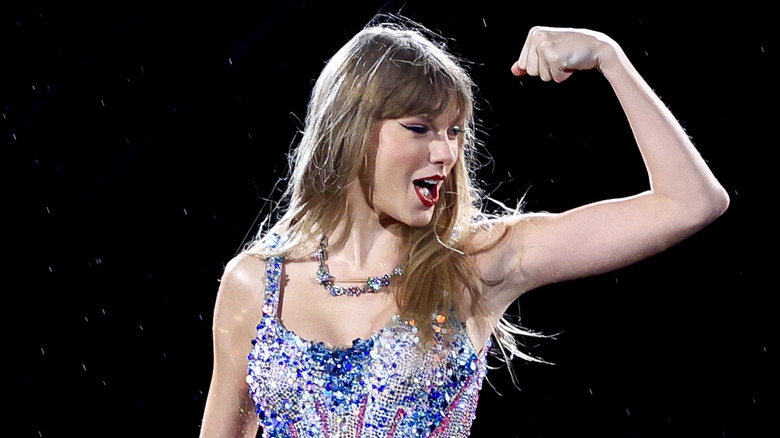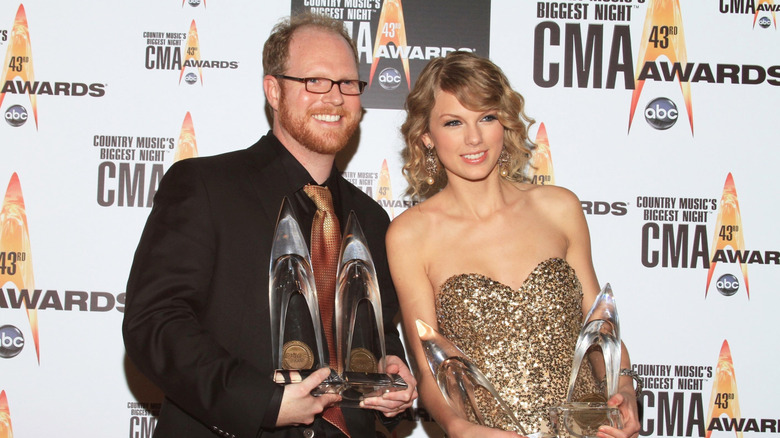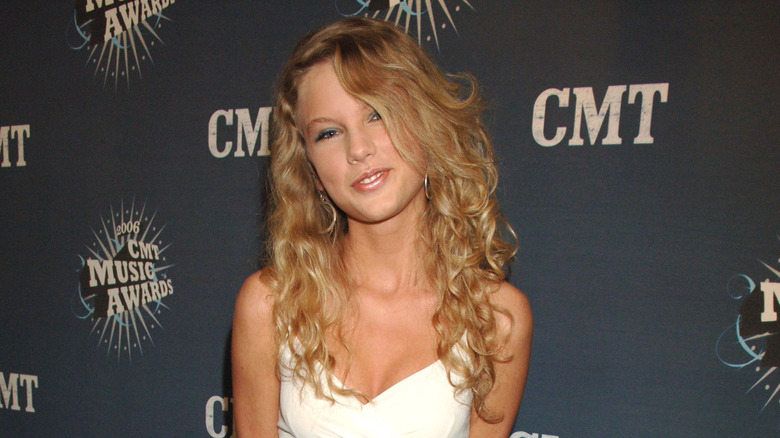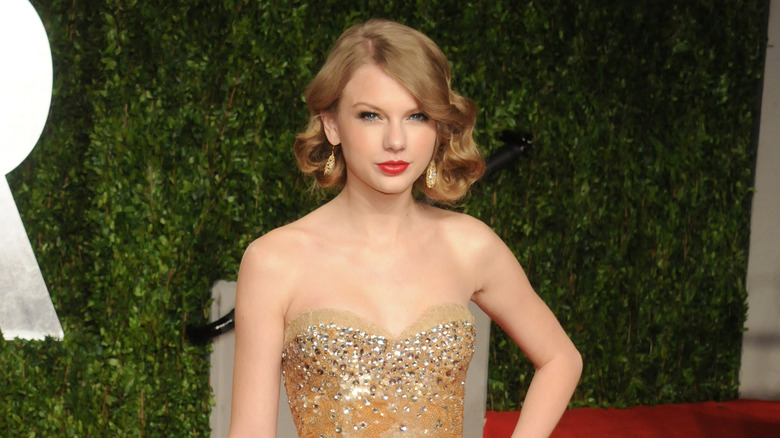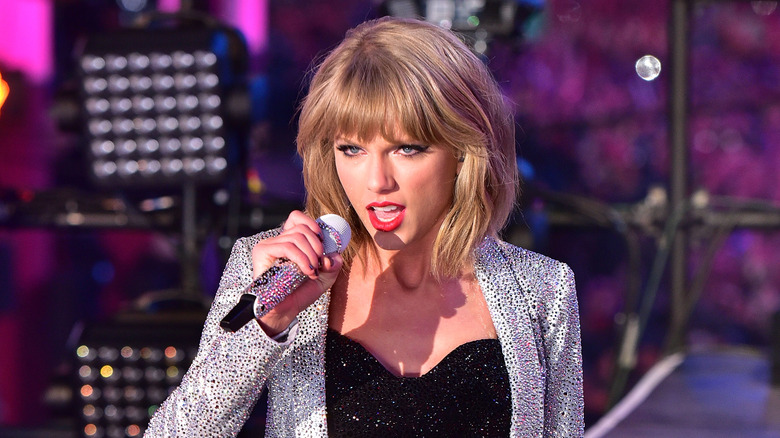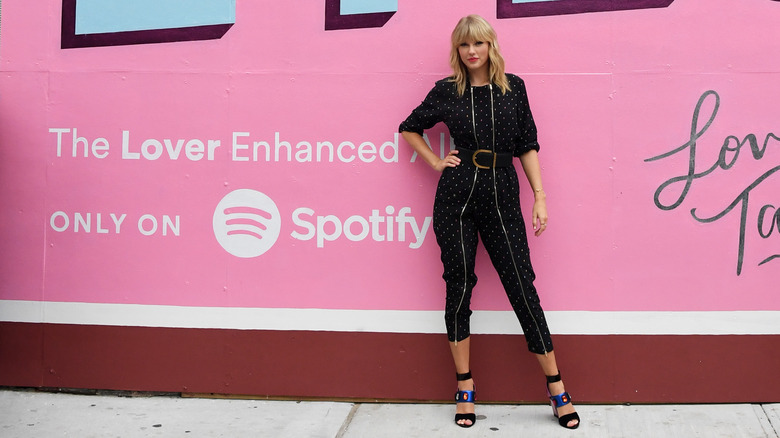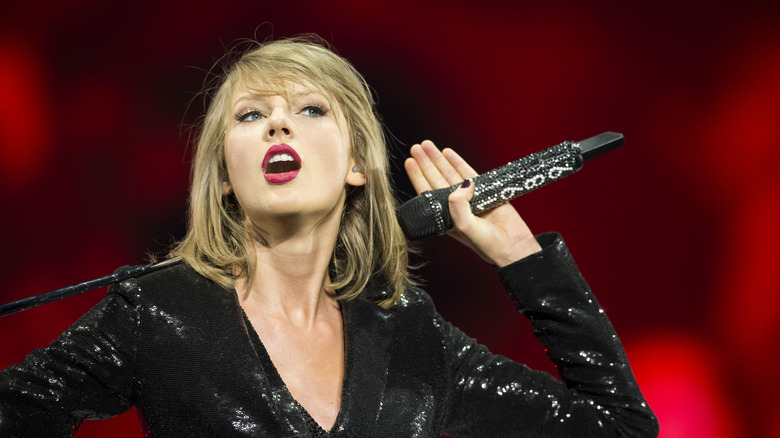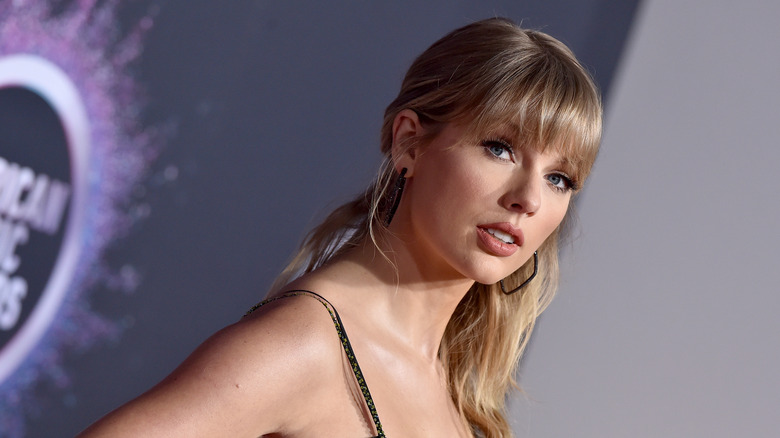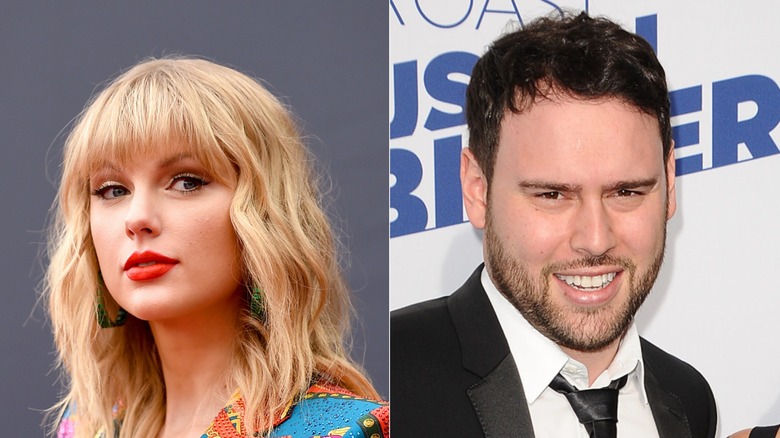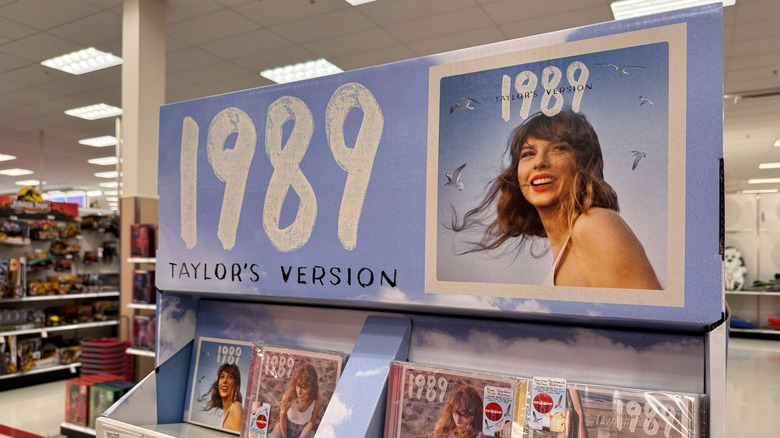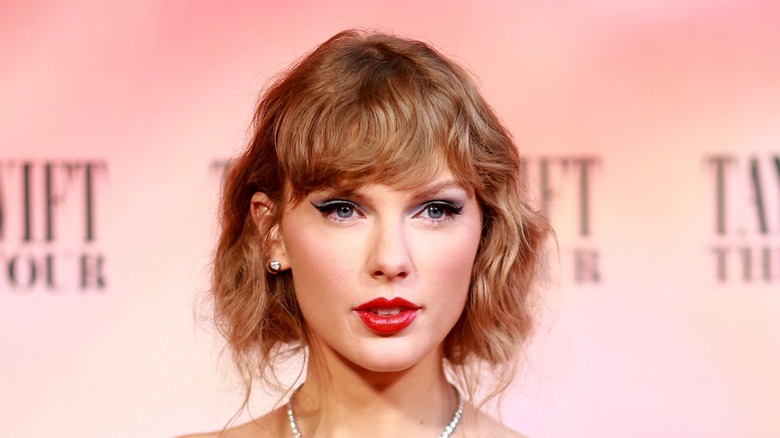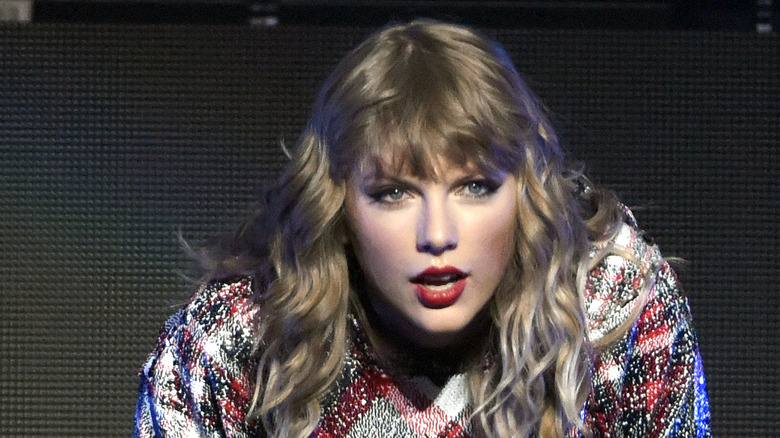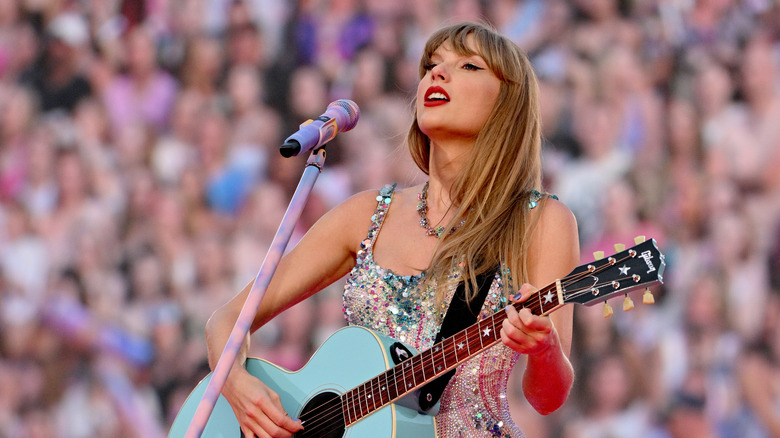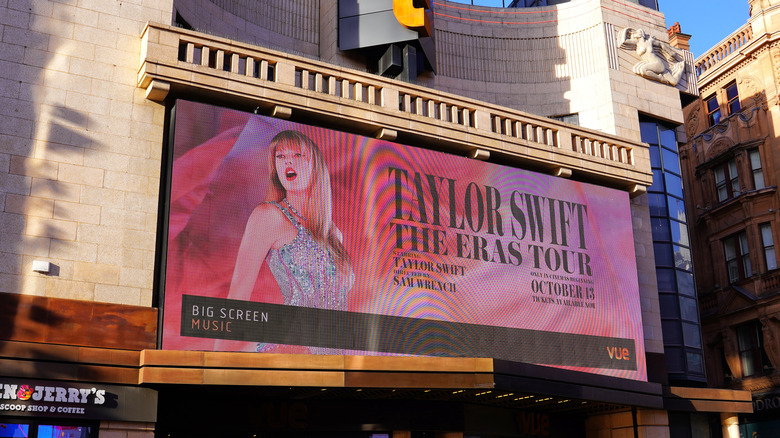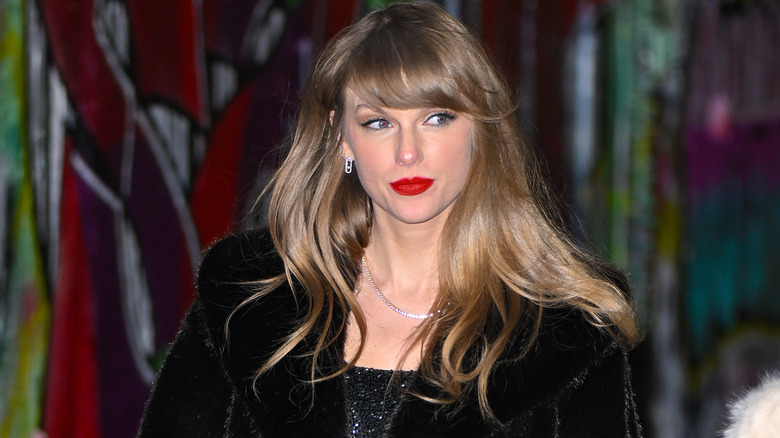Taylor Swift's 14 Power Plays That Reshaped The Music Business
In the annals of musical history, 2023 will be remembered as the year that Taylor Swift flexed her muscles and became a major force to be reckoned with. In fact, Swift's influence was felt well beyond the Billboard charts and stadiums that hosted her sold-out Eras tour. She also made a huge impact on the box office with her Eras tour concert film, while the tour itself spawned the kind of economic windfalls typically associated with such events as the Olympic games or the Super Bowl. And speaking of football, Swift's romance with Kansas City Chiefs star Travis Kelce gifted the NFL with some of its highest TV ratings ever — simply because Swifties who otherwise wouldn't watch football began tuning in to catch a glimpse of the singer supporting her beau during games.
Meanwhile, Forbes estimated that Swift's net worth had soared to $1.1 billion by the end of 2023, she became the most-streamed artist on both Spotify and Apple Music, and she was declared Time's 2023 Person of the Year. Furthermore, 2023 was the year Swift became the 11th person ever to chart 10 No. 1 hits in Billboard's Hot 100 chart.
As her fans well know, Swift didn't achieve all this success without huge talent and serious savvy, and her willingness to ignore conventional wisdom and forge her own path has paid huge dividends. For proof, read on for a look at 14 of Taylor Swift's power plays that reshaped the music business.
She fought to work with inexperienced producer Nathan Chapman
From an early age, Taylor Swift was a musical prodigy, performing in children's theater productions throughout her childhood. At age 11, she sang in front of her biggest audience to date when she performed "The Star-Spangled Banner" at a Philadelphia 76ers game. At 12, she began writing songs, which led to a development deal with RCA Records. She was just 14 when she was signed to Scott Borchetta's Big Machine, a small, Nashville-based upstart record label.
Swift was signed on the strength of demos she'd recorded with rookie producer Nathan Chapman. When recording her first album, Swift wanted Chapman to produce. Borchetta, however, pointed to his inexperience, and the fact that he'd never produced an entire album, to insist that Swift work with more seasoned producers. She tried but wasn't achieving the sound she was hearing in her head, feeling she'd have a better shot at achieving it with Chapman. "So, after a lot of begging and pleading, I got my label to agree to let Nathan Chapman produce my entire first album," Swift said during an interview at the Grammy Museum.
That decision paid off when her 2006 self-titled debut album became a monster hit, led by the success of the single "Tim McGraw." Swift continued to work with Chapman on her next two albums, with the pair taking home two Grammy Awards — Best Country Album and Album of the Year — for her second release, "Fearless" (and a third win, again for Album of the Year, for the 2016 album "1989").
She was one of the first artists to directly connect with fans on social media
It's no secret that Taylor Swift's fanbase is as loyal as it gets, but that fan-artist relationship didn't just pop up out of nowhere. While Swift currently boasts an X (formerly Twitter) following of nearly 95 million, has more than 23 million followers on TikTok, and has a staggering 279 million followers on Instagram, she was an early adopter of social media long before the popularization of those platforms. As longtime Swifties will recall, as early as 2005 she connected with fans via the now-defunct Myspace.
Those posts can still be found; BuzzFeed shared various photos and comments from her Myspace days, while E! News also dug up some of that vintage content, demonstrating that she was something of a pioneer when it came to the now ubiquitous mirror selfie (which, at the time, she took with a digital camera). Teenage Swift also showcased a spicy side, with a tendency to punctuate her posts with the occasional F-bomb.
She also wasn't reluctant to throw some serious shade when warranted. That was obvious in what may arguably be her most famous video from her Myspace days. Responding to Joe Jonas breaking up with her in a phone call lasting less than 30 seconds, Swift is seen displaying a Barbie-sized doll of the Jonas Brothers singer. "See, this one even comes with a phone so he can break up with other dolls!" she joked.
She made philanthropy cool
Taylor Swift has demonstrated her generosity so often that it's become a hallmark of her personality. It all started back in 2011, when she donated 6,000 books — $70,000 worth — to a library in her hometown of Reading, Pennsylvania. A few years later, she sent out "Swiftmas" presents to fans, even sending one $1,989 (in honor of her "1989" album) to help with student loans. Then, upon moving to New York City in 2015, she donated $50,000 from the proceeds of her single "Welcome to New York" to NYC schools.
As Swift's success grew, so too did the measure of her philanthropy. In 2016, she donated $1 million to help the victims of flooding in Louisiana. She also donated another $1 million to relief efforts after a devastating tornado in Tennessee. She's helped individuals in times of need with personal donations, ranging from a woman struggling to pay tuition to a mother of five who'd recently lost her husband to COVID-19.
She's also an exceedingly generous employer. During her Eras tour, Swift gave a $100,000 bonus to each of the 50 or so truck drivers working on the tour — an estimated $5 million. In addition, reports circulated that she also handed out bonuses to others on the tour, including dancers, members of her band, sound and lighting technicians, catering staff, and more. Another benefactor of the Eras tour has been food banks, with Swift donating to local organizations in each city in which she's performed.
Her Wall Street Journal op-ed accurately predicted the future of the music industry
By 2014, Taylor Swift had accomplished her wildly successful shift from country music phenom to pop superstar. At only 24 years old, she opined on the future of the music industry in an op-ed for The Wall Street Journal. Referencing a meeting with her label in which she discussed her interactions with fans via Myspace, she wrote, "In the future, artists will get record deals because they have fans — not the other way around."
She also shared her thoughts on the album format. "In my opinion, the value of an album is, and will continue to be, based on the amount of heart and soul an artist has bled into a body of work," she wrote, noting that while fans were buying fewer albums, they hadn't stopped altogether. "They are buying only the ones that hit them like an arrow through the heart or have made them feel strong or allowed them to feel like they really aren't alone in feeling so alone," she noted.
According to Swift, the new generation of music fans saw music the same way they viewed relationships. "Some music is just for fun, a passing fling," she said, referencing songs that people dance to at parties or nightclubs, but eventually fade from memory. "Some songs and albums represent seasons of our lives," she added, "like relationships that we hold dear in our memories but had their time and place in the past." Looking back, she hit the nail on the head with her predictions.
She pulled all her music off Spotify to protest their low payments to artists
Despite being at the pinnacle of the music business, Taylor Swift realized the same new technology that made it easier for her music to get into the ears of fans was also leading to a position where the artists producing that music were severely underpaid. "Piracy, file sharing and streaming have shrunk the numbers of paid album sales drastically, and every artist has handled this blow differently," she wrote in her WSJ op-ed.
Spotify, the most predominant music-streaming service, pays artists each time a song is streamed; that amount, however, is infinitesimal, between $0.006 and $0.0084 per stream, meaning a song that is streamed a million times would only earn an artist about $6,000 to $8,400 — hardly rock-star money.
Feeling artists were being ripped off, Swift's protest was evident in the arrival of her "1989" album, which initially wasn't available on Spotify. A few weeks after its release, she pulled her entire catalog from Spotify. Speaking with Yahoo! Entertainment, Swift said that Spotify "feels to me a bit like a grand experiment. And I'm not willing to contribute my life's work to an experiment that I don't feel fairly compensates the writers, producers, artists, and creators of this music. And I just don't agree with perpetuating the perception that music has no value and should be free ... I thought, 'I will try this; I'll see how it feels.' It didn't feel right to me."
She called out Apple Music for stiffing artists and songwriters during free trial
While Taylor Swift eventually returned to Spotify, she subsequently got into a spat with a different music-streaming service. Upon the launch of Apple Music in 2015, the company offered users a three-month free trial. When Swift learned Apple wasn't paying artists during the trial, she wrote an open letter to the company. "I find it to be shocking, disappointing, and completely unlike this historically progressive and generous company," she wrote, as reported by Stereogum. "Three months is a long time to go unpaid, and it is unfair to ask anyone to work for nothing."
Continuing her letter, Swift encouraged Apple to reverse course and do the right thing. "It's not too late to change this policy and change the minds of those in the music industry who will be deeply and gravely affected by this." She concluded by making a comparison that was impossible to ignore. "We don't ask you for free iPhones," she explained. "Please don't ask us to provide you with our music for no compensation."
Meanwhile, Swift also insisted that she was using her considerable platform to fight for other artists whose voices wouldn't be heard, yet who were being affected considerably more than she was. "This is not about me," she explained. "This is about the new artist or band that has just released their first single and will not be paid for its success."
She pushed back at sexist double standards in the music industry
Because she was so young when she started out in the music industry, Taylor Swift came of age beneath the harsh glare of the spotlight, her romantic relationships becoming tabloid fodder. "When I was, like, 23 and people were just kind of reducing me to ... kind of making slideshows of my dating life ... just to slut-shame, you know?" she said during an interview with Apple Music's Beats 1, via People.
"That happened to me at a very young age, so that was a bit hard. That was one of the first times I was like, 'Wow, this is not fair,'" she added. During that interview, she also pointed out the double standard that existed in the music industry; male artists write love songs all the time, but when women do that becomes a belittling character trait. Furthermore, ambitious male artists are often described as shrewd or tough, while women exhibiting the same qualities are characterized as difficult — or worse.
"I don't think people understand how easy it is to infer that someone who's a female artist or a female in our industry is somehow doing something wrong by wanting love, wanting money, wanting success," Swift said. "Women are not allowed to want those things the way that men are allowed to want them ... I really truly don't think I did anything wrong by having a normal dating life in my early 20s."
She clapped back hard when her master recordings were bought out from under her
After recording her sixth album for Big Machine, 2017's "Reputation," Taylor Swift exited the label. She subsequently signed with Republic Records.
Soon after, Scott Borchetta sold Big Machine to Ithaca Holdings, a company controlled by music manager Scooter Braun, whose clients included Justin Bieber, Ariana Grande, and others. The sale included the master tapes of Swift's first six albums. She responded with an open letter posted to Tumblr. "For years I asked, pleaded for a chance to own my work. Instead I was given an opportunity to sign back up to Big Machine Records and 'earn' one album back at a time, one for every new one I turned in," she wrote, explaining she turned down the deal because she knew Borchetta would sell regardless of whether she signed on. "I had to make the excruciating choice to leave behind my past," she added
Losing the chance to own her masters was one thing, but seeing them go to Braun was a tough pill to swallow. "All I could think about was the incessant, manipulative bullying I've received at his hands for years," she wrote, revealing her new label gave her full ownership of the masters she'd be recording for them. "Thankfully, I left my past in Scott's hands and not my future," she added. In 2020, Braun sold Swift's masters to an investment fund for a reported $450 million — $150M more than he'd paid.
Her decision to rerecord her first five albums has been massively successful
Having made her displeasure known about the sale of her masters to Scooter Braun, Taylor Swift fired back with a genius plan. Appearing on "Good Morning America," she announced that she'd be re-recording and releasing the albums she made for Big Machine. "It's something I'm very excited about doing because my contract says that starting November 2020 ... I can record albums one through five all over again," she said, adding, "Artists deserve to own their work."
How these re-recorded new albums would be received, however, was anyone's guess — because no artist had ever attempted it before. However, those albums — which she dubbed "Taylor's Version" — proved to be more successful than anyone imagined. When she asked fans to stop listening to the original albums and instead embrace the new recordings, they did. As a bonus, in addition to the newly recorded album tracks, the releases also included various unreleased "From the Vault" songs as a bonus. The first of these — "Taylor Swift: Taylor's Version" — was an instant smash, as were the rerecorded "Fearless" and "Speak Now" albums.
When "1989: Taylor's Version" was released in October 2023, it debuted at No. 1 on the Billboard album chart, with all 21 tracks landing on Billboard's Hot 100 chart. Selling more than 1.6 million equivalent album units, the rerecorded "1989" brought in the biggest single-week sales of 2023, and the biggest of any album since Adele's "25" in 2015.
She's fought back fiercely when hit with lawsuits
Artists ranging from George Harrison to Ed Sheeran have been sued for copyright infringement over claims that their songs ripped off those written by others. Taylor Swift found herself in similar straits when she was sued in 2017 by songwriters Sean Hall and Nathan Butler, who claimed Swift lifted lyrics from their 2011 song "Playas Gon' Play" for her 2014 hit "Shake It Off." The suit was eventually dropped when a settlement was reached. However, that was the second time Swift had been sued over that same song, with Jesse Graham seeking $42 million over his allegations that she stole lyrics from his 2013 track "Haters Gonna Hate." That lawsuit was dismissed.
Swift was sued again in 2021, by Utah's Evermore theme park, which claimed she'd stolen the title for her "Evermore" album, as well as design elements and artwork. Swift's lawyers responded, noted NME, by describing the suit as "baseless ... frivolous and irresponsible." Then, in 2022, she was sued by Teresa La Dart, a Mississippi poet who claimed that Swift stole various elements from her self-published book "Lover" and used them in her own companion book for her 2019 album "Lover." La Dart dropped the suit.
Arguably the weirdest lawsuit Swift has ever been hit with, however, was when Russell Greer sued in 2016, seeking $7,000 for emotional distress because Swift ignored the unsolicited songs he sent her.
She refused to back down when sued by a groping radio deejay
Of the various lawsuits to have been filed against Taylor Swift, the one that rankled her the most was launched by David Mueller, a Denver radio deejay. In his suit, he claimed he was fired after Swift complained that he had reached beneath her skirt and grabbed her butt while posing for a photo during a pre-concert meet-and-greet in 2013. Mueller, however, insisted he did not grope Swift, and accused her of costing him his job. Swift countersued, alleging assault and battery; Mueller sued again, this time claiming she'd slandered him.
In her deposition, Swift described Mueller's alleged behavior. "Right as the moment came for us to pose for the photo, he took his hand and put it up my dress and grabbed onto my ass cheek and no matter how much I scooted over it was still there," she said, as reported by E! News. "It was completely intentional. I've never been so sure of anything in my life ... I remember being frantic, distressed, feeling violated in a way I had never experienced before."
The case went to trial, with the jury ultimately finding in Swift's favor — likely because the photo at the center of her allegations was a key piece of evidence, in which Mueller's hand can clearly be seen exactly where Swift said it was. Swift was awarded the damages she sought: a symbolic $1.
She revolutionized the concert experience with her Eras tour
Taylor Swift took touring to a new level with her 1989 tour, at which she invited a who's who of special guests onstage, ranging from rock gods (Aerosmith's Steven Tyler and The Rolling Stones' Mick Jagger) to various country and pop stars.
Her Eras tour, which kicked off in March 2023, left all others in the dust. Featuring music from all stages of her career, Swift performed hit after hit during shows that typically ran three-plus hours. The tour proved to be a game changer, coining the term the "Taylor Swift effect" for the massive boost that her concerts gave to the local economy during each stop. In fact, the first U.S. leg of the tour — wrapping in August 2023 — potentially generated consumer spending of close to $5 billion. "If Taylor Swift were an economy, she'd be bigger than 50 countries," Dan Fleetwood, president of QuestionPro Research and Insights, told GlobalNewsWire. Meanwhile, Swift herself was estimated to earn a staggering $4.1 billion from the tour.
As the Economic Times noted, Swift's touring strategy diverged sharply from the way a concert tour had typically been handled, with artists moving from the first date to the last date as quickly as they can. Swift took a different approach, scheduling shows on weekends. That looser schedule allowed the opportunity to add a second (or even third) show to accommodate demand — which was always there — and essentially doubled the number of tour dates, and, by extension, the profits.
She changed Hollywood's game by bypassing the studios to release her concert film
In addition to sales of concert tickets and exclusive tour-related merch, Taylor Swift generated even more revenue from her Eras tour by releasing a concert movie documenting the tour, which proved to be so lucrative it was extended to 2024. Arriving in October 2023, the release of "Taylor Swift: The Eras Tour" was unconventional, representing yet another innovative power move.
As Puck News reported, Swift hired director Sam Wrench to film her shows for an eventual movie, with a budget of between $10-$20 million. Swift and her team reportedly met with various movie studios about releasing the film. Due to studios' longer lead times and carefully orchestrated slates of release dates, she was told the film wouldn't be released until 2024 at the earliest. Swift, however, wanted to strike while the iron was still hot and came up with another idea: to bypass the studios and release the film directly in AMC theaters throughout the U.S. Not only did this cut out the middleman (and the associated fees), the concert film arrived far earlier than it otherwise would have.
Not only were the major studios blindsided by the unprecedented move, but the result was a huge moneymaker for Swift; after a $92-million opening weekend at the domestic box office, "Taylor Swift: The Eras Tour" ultimately raked in $250 million worldwide — more than a dozen times what it had cost to make.
Her bold transition into film directing promises to make her a Hollywood player
The box-office success that Taylor Swift experienced from her Eras tour concert film was only the beginning of what promised to be her eventual domination of Hollywood. While Swift has acted onscreen before — most notably in such films as 2010's "Valentine's Day," 2019's "Cats," and 2022's "Amsterdam" — her next power move is taking her behind the camera.
In 2022, Searchlight Pictures announced it had signed Swift to make her feature directorial debut, filming a script that she'd written herself. "Taylor is a once in a generation artist and storyteller," said Searchlight presidents David Greenbaum and Matthew Greenfield in a statement to Variety. "It is a genuine joy and privilege to collaborate with her as she embarks on this exciting and new creative journey." While details of the project were kept under wraps, Swift is far from a novice when it comes to directing. Not only has she been directing her own music videos since 2008, but Swift also won raves for directing her 14-minute "All Too Well: The Short Film" in 2021, featuring actors Dylan O'Brien and Sadie Sink.
The way Swift sees it, directing is a natural extension of her songwriting, which has always been about storytelling. "I always wanted to tell stories. I have always written stories, poetry, songs. And I think this just grew out of that storytelling," she told Variety of directing. "And the more I did it, the more I loved it."

